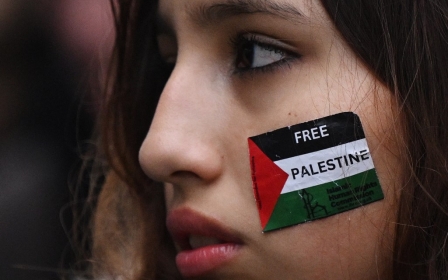Israel-Palestine war: How Qatar defied the odds in Gaza mediation

After more than six weeks of fighting, the Israel-Hamas deal to release hostages in exchange for humanitarian aid and the release of Palestinian prisoners marks a victory for diplomacy in dark times of war. It is also a soft-power victory for its broker, Qatar.
The relatively small Gulf state has played an outsized role in finding a diplomatic way out of the hostage crisis in Gaza, allowing much-needed humanitarian aid into the enclave while avoiding a greater regional flareup - at least for now.
Qatar’s mediating role is based on the pursuit of relevance through interdependence, making itself an indispensable partner that connects state and non-state actors, small and great powers, unlikely negotiation partners and ideological rivals.
Establishing itself as a geopolitical hub for brokerage and dialogue is an essential component of the emirate’s network-centric approach to statecraft.
It is such an essential part of Qatar’s DNA that the commitment to mediation was enshrined in Article 7 of its 2003 constitution. The ruling Al Thani family has discovered that a position of principled neutrality can provide the small state, wedged between rival powers, with access, leverage and relevance, which can in turn translate into influence and strategic depth.
Stay informed with MEE's newsletters
Sign up to get the latest alerts, insights and analysis, starting with Turkey Unpacked
In Palestine, and Gaza in particular, Doha has had a unique selling point and a monopoly over the diplomatic environment since the mid-2000s. It was then that it tried unsuccessfully to broker a deal between the rival Palestinian factions of Hamas and Fatah.
While the deal fell through, the mediation effort added important contacts to Qatar’s address book, which it could call upon during successive Gaza wars. In 2012, the Obama administration lobbied Doha to grant Hamas a political office in the country after its leaders left Syria.
Trusted channels
In addition, hosting the Taliban upon US request meant that Qatar was indispensable as Washington worked to withdraw from its lengthy war in Afghanistan.
Equally, Qatar’s unique relationship with Iran, which is built on pragmatism rather than deep-seated, mutual trust, has been of use for consecutive US administrations trying to speak to the leadership of the Islamic Republic through trusted channels. In September, Qatar brokered a hostage deal between Iran and the US.
Follow Middle East Eye's live coverage for the latest on the Israel-Palestine war
Against the backdrop of Qatar’s pedigree as a trusted broker, it was not surprising that the US especially looked swiftly to Doha to come to the rescue after the 7October atrocities committed by Hamas and the ensuing Israeli bombardment of Gaza.
Doha had proven itself to be a trusted go-between for Israel and Hamas since the 2008-9 Gaza war. All ceasefires agreed between the two sides over the past 14 years have only been possible because both Israel’s security services, and the political and armed wings of Hamas, trust Qatar as a transparent broker.
Qatar has demonstrated degrees of imagination that most other actors with vested interests in the conflict are lacking
Unlike other regional countries, Qatar does not have the historical baggage that could undermine its role as a mediator - even if its adventures in the Arab Spring still weigh on the Gulf state’s image.
Doha’s role in brokering the US withdrawal from Afghanistan with the Taliban, and facilitating the extraction of Nato troops and citizens in 2021, helped shed most of the memories of its activism during the Arab Spring.
Qatar’s important backchannel between Washington and Tehran over the years has also aided in this regard. For the US, Qatar has become its most reliable and important ally in the Gulf, at a time when its neighbours are cosying up to Russia and China.
Although Qatar’s position on Palestine is clear - no normalisation with Israel unless it commits to a two-state solution - Doha has proven itself a pragmatic mediator, able to put rationality first and emotions second.
The ability to leave ego at the door has allowed Qatari negotiators to engage with western counterparts who often hold diametrically opposed views on Israel’s war on Gaza.
Speaking with one voice
Qatar’s empathy with the victims of the 7October attack has been a crucial element in establishing a rapport with Israeli brokers, signalling that Doha was outraged by the atrocities committed in the name of Hamas. Qatar’s ambassadors to the US and UK have met relatives of the hostages, clearly affirming Qatar’s commitment to doing everything possible to get the hostages released.
In a conflict where both of the warring factions have displayed disunity and a lack of cohesion - Hamas because of its networked structure, and Israel because of its polarised political and security landscape - Qatar was able to speak with one voice. The reason for this is that the small, homogenous state has not been distracted by internal politics.
Mediation has taken place in a very personalised space, where decisions continue to be made within a restricted circle at the very top strategic level.
In a highly polarised and fast-moving information environment, where the media circus and political narratives often matter more than action and policy, Qatar’s mediators have been extremely patient. Requests and demands from both Hamas and Israel kept changing, especially as Israel’s far-right government repeatedly rejected diplomatic solutions in order to score political points.
Time appears to have played in Qatar’s favour, however, as public anger continued to mount in Israel against the failed policies and lack of strategy of the Netanyahu government.
Finally, Qatar has demonstrated degrees of imagination that most other actors with vested interests in the conflict are lacking.
Looking ahead, this deal is an interim victory. It can hopefully lay the foundations for a diplomatic offramp to decelerate the military-only approach that Israel has so far favoured.
Qatar must now prove that it can take the next step, and use this momentum to expand the deal beyond the short term. It would be a geopolitical coup if the small state of Qatar could corral western governments and Arab partners into building a long-term agreement that could ultimately form the basis for a two-state solution.
The views expressed in this article belong to the author and do not necessarily reflect the editorial policy of Middle East Eye.
Middle East Eye delivers independent and unrivalled coverage and analysis of the Middle East, North Africa and beyond. To learn more about republishing this content and the associated fees, please fill out this form. More about MEE can be found here.






